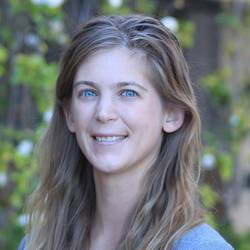By: Jeff Deal, Conference Chair, Predictive Analytics World for Healthcare
How do outbreaks change under different responses and can this be statistically predicted? We interviewed the lead statistician working with the Malian government on the 2014 Ebola outbreak and public health response.
In anticipation of her upcoming conference presentation at Predictive Analytics World for Healthcare Las  Vegas, May 31-June 4, 2020, we asked Colleen Farrelly, Co-Founder & Chief Scientist at Quantopo LLC, a few questions about their deployment of predictive analytics. Catch a glimpse of her presentation,Tracking and Predicting Ebola Outbreaks, and see what’s in store at the PAW Healthcare conference in Las Vegas.
Vegas, May 31-June 4, 2020, we asked Colleen Farrelly, Co-Founder & Chief Scientist at Quantopo LLC, a few questions about their deployment of predictive analytics. Catch a glimpse of her presentation,Tracking and Predicting Ebola Outbreaks, and see what’s in store at the PAW Healthcare conference in Las Vegas.
So that you, the reader, have a bit of context on our discussion, here is the description of upcoming Colleen’s PAW Healthcare presentation on predicting Ebola outbreaks: This talk overviews Quantopo’s efforts to understand the anatomy of an Ebola outbreak and predict how an outbreak will change under different responses. This work extends previous work on the 2014 West African Ebola outbreak and operational support in Mali. Results presented in this talk were used to support disaster response ground operations in the Democratic Republic of the Congo and position workers in areas likely to be hit the hardest in the weeks after the analysis. Regrettably, operational support was stymied by violence against aid workers and lack of international funding for a swift response
Q: In your work with predictive analytics, what area of healthcare are you focused on?
A: I’ve focused on several areas, including genomic medicine, public health, and epidemic tracking. I love the complexity of factors impacting things like human behavior and disease processes. Reviving a failed drug trial that ended up helping a subset of patients who didn’t respond to any existing treatment was one of my career highlights.
Q: What outcomes do your models predict?
A: It depends on the project. I’ve predicted disease spread (mainly within the 2 recent Ebola epidemics), behavioral outcomes (adolescent drug use, for instance), and likely diagnoses based on symptoms and genetic information. I’ve also predicted things like health technology usage, increased demand, and future cost of patients on different treatment plans.
Q: How does predictive analytics deliver value at your organization? What is one specific way in which it actively drives decisions or impacts operations?
A: Quantopo is the one creating the technology. We’ve been able to pinpoint future severity and locations at risk for deadly outbreaks, including the current Ebola outbreak in the DRC. This has helped responders plan limited resources and target areas likely to become hotbeds before they become problematic.
Q: Can you describe a successful result, such as the predictive lift of your model or the ROI of an analytics initiative?
A: We were able to accurately predict the course of the Ebola epidemic, down to likely issues from local rebel groups and dangers of spread across the borders to cities in Rwanda and Burundi.
Q: What surprising discovery have you unearthed in your data?
A: There have been a few. In our Ebola analysis, we accidentally found travel routes of local rebels and warlords. We noticed migration patterns among impacted villages, and a couple days after reporting it, the first attacks on aid workers started.
Q: What areas of healthcare do you think have seen the greatest advances or ROI from the use of predictive analytics?
A: Definitely genomic medicine. Patient management probably has the potential to save a lot on healthcare costs, but genomic medicine literally would not exist without machine learning and advanced analytics tools to analyze GWAS studies and deep sequencing.
Q: Sneak preview: Please tell us a take-away that you will provide during your talk at Predictive Analytics World.
A: Partnerships and buy-in are key. If stakeholders won’t or can’t act, analytics won’t add much value. In the most tragic cases, this leads to the unnecessary loss of lives.
—————————–
Don’t miss Colleen’s presentation, Tracking and Predicting Ebola Outbreaks, at PAW Healthcare on Wednesday, June 3, 2020 from 2:15 PM to 3:00 PM. Click here to register for attendance.
By: Jeff Deal, Conference Chair, Predictive Analytics World for Healthcare
You must be logged in to post a comment.
The Machine Learning Times © 2020 • 1221 State Street • Suite 12, 91940 •
Santa Barbara, CA 93190
Produced by: Rising Media & Prediction Impact


Quantopo seems to be doing a decent job. Indeed a great achievement of reviving a failed drug trial that ended up helping a subset of patients who didn’t respond to any existing treatment. Would love to work at Quantopo without any second thoughts.